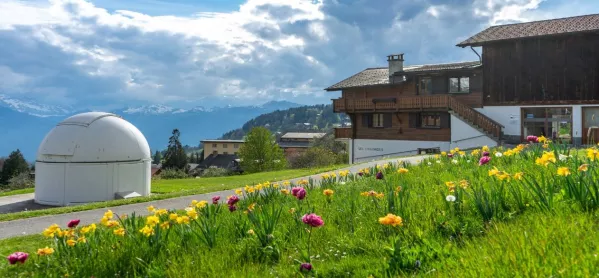- Home
- How to make a curriculum so pupils discover themselves
How to make a curriculum so pupils discover themselves

Situated in the Swiss Alps by Lake Geneva, Aiglon College occupies an enviable geographical location.
And as the director of learning at the school, Tom Duckling, explains, it’s a location that it takes full advantage of: “We have a view of the alps and, in the summertime, we have mountain biking and in the winter a full skiing programme - they ski twice a week for half a day,” he says, speaking on the latest Tes international podcast.
And this outdoor ethos underpins a big focus within the school around using outdoor learning - through trips overseas and local expectations - to deliver its Discovery Programme curriculum for Years 7, 8 and 9.
“It’s our own unique bespoke curriculum [...] based upon ideas that were set up by our founder, John Corlette, 70 years ago.”
“Every Aiglon student will do three minimum expeditions per term, in any one weekend about 50 per cent of the school is out on expedition…rock-climbing, skiing…, all sorts of really intrepid things, sometimes 10 to 15 times a year.”
Mind, body and spirit
The idea is not that these outside activities are just a chance for a fun day out or to learn a new skill, but they are a core element of helping deliver on the key aims of the school’s guiding principle of “the balanced development of mind, body and spirit”.
This has always been its overriding goal since the school’s founding - but the Discovery Programme itself is fairly new, and was created when the school decided it wanted to more closely align its mix of education offerings into one holistic curriculum.
“The Discovery Programme started when our assistant head of curriculum saw a gap in our provision - we had the iGCSE and IB, we had this incredible expeditions programme but, to be honest, our Year 7 to 9 programme was fine but a bit disparate, a bit disjointed.
“So, the idea was to build a framework that overrode not only what happened in classrooms but the whole school so the Discovery Programme […] tries to unite our classroom, our co-curricular programme and our expeditions programme.”
It does this by posing big questions that underpin the focus of that year’s education, such as “Who are we and where do we come from?” in Year 7, “How do I express myself?” in Year 8 and “How do we know the world?” in Year 9.
Holistic trips
While on the face of it these issues may sound more suited to the humanities, Duckling says they can be applied to all subjects.
“Our sciences department is incredibly excited to relate this philosophical type questions to DNA and so forth, so they sit over all of our subjects.”
And again this is where local expeditions and trips overseas - to locations such as Greece, the US and Cambodia - are designed to address these questions through the lens of a mix of subjects and ideas.
“One of the trips we do is to Corfu - on that trip they are following the route of Odysseus and doing a sailing qualification and part of that is learning how to sail a boat, but also it’s about vectors in mathematics, and the history of Greece and the poetry that comes with that.”
Find inspiration anywhere
Of course, the school is privileged to be able to offer such trips, but Duckling says the key point is not that the trip is about going somewhere impressive or far-afield, but is linked to delivering the school’s aims - something that can ultimately be achieved anywhere, if required.
As such, while coronavirus has, of course, curtailed its ability to deliver these trips, he says the fact it has happened is, in some ways, a good opportunity to prove this point: students can still engage in the curriculum it has created without these trips.
“Some people would criticise this as you just want to go on trips - but actually, for me, it’s not about the trips; it’s about the theory and ethos of our school and our concept of learning and, in many respects, when you remove the trips, those questions and themes and connectivity among subjects become more apparent.
“So, we could run it for a year without trips because it’s the underlining theory and goals that are more important to me than just the trips.”
Of course, though, the hope is that, in time, expeditions and trips will return - even if they take place closer to home.
That, though, would hardly be the biggest hardship or the school and its pupils:
“We are very fortunate with the world around us - we are on a mountainside with a ski resort above us and Lake Geneva at the bottom of the hill so, in terms of where environments are that you can be stuck to find learning experience around you, it’s not that hard to adapt.”
You can listen to the full interview below in the latest edition of the Tes International Podcast
Dan Worth is senior editor at Tes
Keep reading for just £1 per month
You've reached your limit of free articles this month. Subscribe for £1 per month for three months and get:
- Unlimited access to all Tes magazine content
- Exclusive subscriber-only stories
- Award-winning email newsletters



